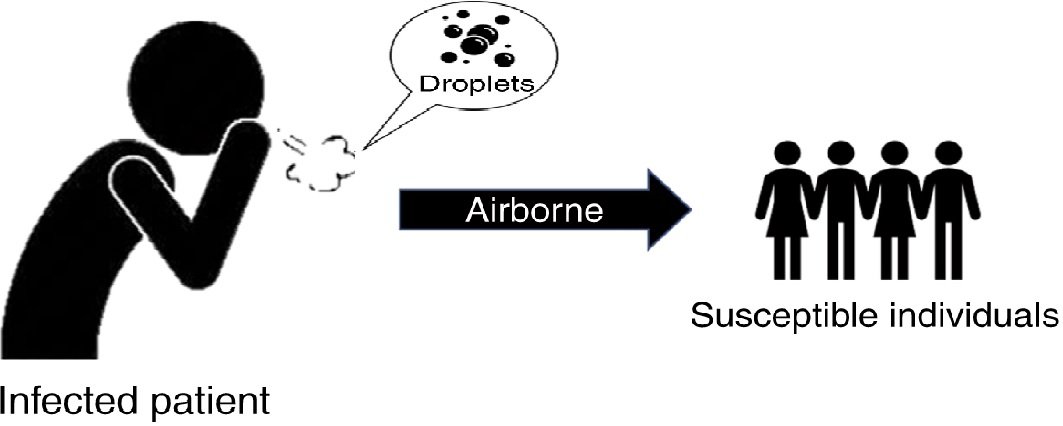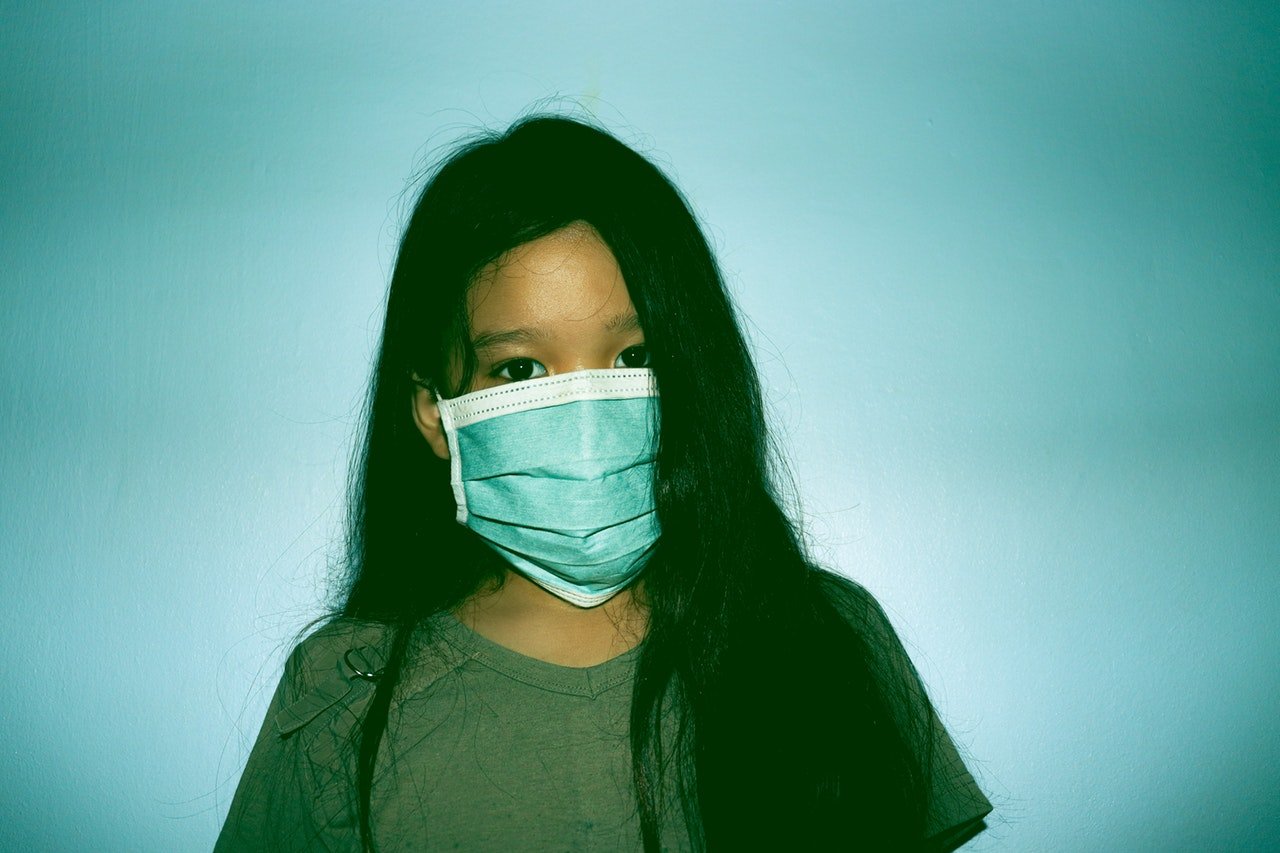CoronaVirus tips: Information about COVID-19, Face masks, N95 mask, N99 mask, Surgical mask & Homemade mask ->
What is facemask?
It is a breathing filter covering made of fibers or gauze and it covers over the mouth and nose to protect against air pollutants, or made of sterile gauze and worn to prevent infection from infection-causing agents such as bacteria, viruses, etc. by preventing them to enter inside our body through mouth and nose.
These viral particles are basically stick on the surface of aerosols or on the surface of respiratory droplet particles (spread when an infected person coughs or sneezes), which can be penetrated by the facemasks since masks are effective at capturing these aerosol and droplets particles, which is a main transmission route of coronavirus.

COVID-19 Virus is believed to spread through respiratory droplets when an infected person coughs or sneezes, or from coming into contact with an infected surface and then touching eyes, nose or mouth.
How Microbial Life (bacteria and viruses) sustain on Surfaces?
Microorganisms attach & grow to surfaces and develop biofilms. Biofilm-associated cells can be differentiated from their suspended counterparts by the generation of an extracellular polymeric substance (EPS) matrix. Attachment is a complex process regulated by diverse characteristics of the growth medium, substratum, and cell surface. An established biofilm structure comprises microbial cells and EPS, has a defined architecture, and provides an optimal environment for the exchange of genetic material between cells [1].
What biofilm is?
A biofilm[1] is a group of microbial cells that is irreversibly associated (means cannot be removed by gentle rinsing) with a surface and enclosed in a matrix of primarily polysaccharide material. This biofilm can be found on:
- Cellular materials – ex. Organs, skin, blood components & intracellular cells.
- Noncellular materials – ex. mineral crystals, corrosion particles, clay or silt particles.
Can a face mask protect us from the CoronaVirus (COVID-19 Virus) pandemic?
If someone is likely to be in close contact with an infected person (COVID-19 Virus-infected) then masks (Surgical mask, N95 mask, N99 mask) play an important role in cuts the chances of the disease being passed on.
If someone is having or showing symptoms of coronavirus in that scenario wearing a mask can also protect others. So masks are crucial for both infected and non-infected ones including health, social care workers and also for both the patient and carer as well. However, some studies also claim that wearing a face mask is certainly not a complete guarantee that you won’t get an infection of COVID-19 Virus because viruses can also transmit through the eyes.
There are also some pieces of evidence out there that show that COVID-19 may also be transmitted through smaller airborne droplets such as aerosols according to the WHO.
CoronaVirus Tips:
Currently, there are no specific vaccines or treatments for COVID-19. To prevent infection and to slow transmission of COVID-19 follow given CoronaVirus Tips:
Do:
- More you stay home more you avoid transmission.
- Avoid unnecessary travel.
- Cover your nose and mouth when coughing or sneezing.
- If you feel unwell, just stay home.
- Regularly, clean your hands with soap and water, or alcohol-based hand rub.
- Avoid touching your face.
- Refrain from smoking and other activities that weaken the lungs.
- Maintain at least 1-meter distance between you and people coughing or sneezing.
- Practice physical distancing/ social distancing.
- Staying away from the crowd (groups of people)/gathering/assembly etc.
Don’t:
- Touch your eyes, nose, or mouth if your hands are not clean.
- People with fever, cough or difficulty breathing should call their doctor and seek medical attention.
CoronaVirus tips for babysitter, parents & childcare:
- The babysitter should wash or clean their hand regularly either by handwash (for at least 25 seconds) or use an alcohol-based sanitizer.
- Regularly clean and disinfect surfaces and objects that the children touch a lot. Presently, no additional steps beyond routine cleaning are needed.
- Because children are more sensitive towards infection so try to avoid contact with people who are sick or having symptoms of COVID-19. If a child becomes sick while in care, keep them separate from the other kids.
- Encourage all family members to stay at home and don’t go outside until it is necessary.
- Cover your mouth and nose with a tissue if you sneeze or cough, then throw it out of reach of children.
Following are few CoronaVirus tips suggested by the WHO (World Health Organization) related to when & how to use the mask:
When to use a mask (Here WHO suggested some of these CoronaVirus tips you can visit the given link for more details):
- If you are healthy, you only need to wear a mask if you are taking care of a person with the suspected 2019-nCoV infection.
- Wear a mask if you are coughing or sneezing.
- Masks are effective only when used in combination with frequent hand-cleaning with alcohol-based hand rub or soap and water.
- If you wear a mask, then you must know how to use it and dispose of it properly.
How to wear masks to protect against coronavirus (follow these CoronaVirus tips according to WHO):
- Before putting on a mask, clean hands with alcohol-based hand rub or soap and water.
- Cover mouth and nose with mask and make sure there are no gaps between your face and the mask.
- Avoid touching the mask while using it; if you do, clean your hands with alcohol-based hand rub or soap and water.
- Replace the mask with a new one as soon as it is damp and do not re-use single-use masks.
- To remove the mask: remove it from behind (do not touch the front of the mask); discard immediately in a closed bin; clean hands with alcohol-based hand rub or soap and water.
When the debate comes to masks, the distinction between aerosols and droplets is significant, because surgical masks and homemade masks cannot prevent airborne aerosols transmission, whereas N95, N99 & P95 masks can.
So what is the key difference between homemade masks, surgical masks, N95 mask & N99 mask?
Homemade mask: As we all know surgical masks are produced on the basis to achieve certain standards whereas there are no official guidelines to ensure quality control when you’re making your own masks, Gulick says. Different types of masks can be produced depending upon the type of fabric used in it. CNBC published an interesting article in which experts guided how we should make our own mask. You can also make your own mask at your home – How to make your own mask?
Surgical Mask: Surgical masks are loose-fitting as well as use and through kind of masks (or disposable masks) that cover the mouth and nose. Because these are loosened on both sides, they can’t provide protection from airborne pathogens, according to the U.S. Food and Drug Administration.
But surgical masks do stop larger respiratory droplets and respiratory secretions from spreading. In other words, a surgical mask can’t necessarily prevent a given individual from getting coronavirus infection, but it could help stop other infected people from spreading it.
Whereas, the number in N95, N99 & P95 on masks refers to the percentage of particulate matter 2.5 (PM2.5) that the mask can filter out.
N95 vs N99 Mask:
N95 Mask: These are more protective masks as compared to surgical & homemade masks because they are of tight-fitting on both sides of the face as well as properly covering mouth and nose. These are efficient in filter out airborne particles.
As discussed above Masks with an N95 rating can filter up to 95% of the particulate matter 2.5 (PM2.5) from the air we breathe. Therefore N95 mask can filters out 95% of particulate matter from the air we breathe.
N99 mask: These are bit more protective masks as compared to N95 mask because these are able to filter out (slightly more i.e. 4% more) 99% of the particulate matter 2.5 (PM2.5) from the air we breathe. But at the same time, they produce more difficulty breathing(as they offer more breathing resistance) as compared to the N95 mask.
So N95 mask are especially for those who are at a young age, healthy or have impaired lung function as well as people above 60 years old, pregnant ladies and children are recommended to use N95 mask.
Reference:
1.A Research Paper by Rodney M. Donlan Biofilms: Microbial Life on Surfaces. (https://www.ncbi.nlm.nih.gov/pmc/articles/PMC2732559/)
2.WHO (https://www.who.int/emergencies/diseases/novel-coronavirus-2019/events-as-they-happen)
